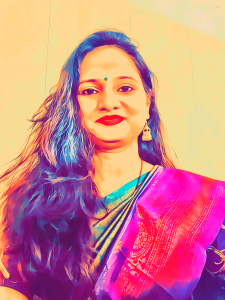209 Letter from Harshada Satghare

Dear Esteemed Researchers,
Namaste! Warm greetings from India.
I write to you with sincere admiration for your remarkable initiative, Women’s Voices in Tourism Research, which has become a beacon of inclusive scholarship, inspiration, and intellectual solidarity for women tourism researchers across the globe. The book’s vision of recognising and amplifying women’s contributions to tourism knowledge deeply resonates with me, not only as an academic but as a woman who has journeyed through unconventional academic transitions to establish herself in the evolving landscape of Indian tourism research.
I am Dr. Harshada Satghare, currently working as an Assistant Professor at Vishwakarma University, Pune (India). My academic path has been anything but linear. Starting with a Bachelor’s degree in Computer Science, I made a life-altering decision to follow my growing passion for people, places, and culture, leading me to pursue a Master of Tourism Administration at Dr. Babasaheb Ambedkar Marathwada University, Maharashtra. This decision changed the course of my life.
Guided by visionary mentors like Dr. Madhuri Sawant and Dr. Rajesh Ragde, I discovered my passion for tourism research. I worked as a project fellow for an ICSSR-funded Major Research Project focused on tourism impacts and later completed my Ph.D. in Tourism Administration, specialising in internet marketing among DMOs of India. I was honoured to be awarded the UGC Junior and Senior Research Fellowship (JRF & SRF) in 2014 by the University Grants Commission, Government of India—an academic turning point that gave me both recognition and responsibility.
Today, my research interests and teaching focus span across tourism marketing, spice tourism, Buddhist tourism, consumer behaviour, and sustainable destination development. My scholarship actively seeks to bridge theory and practice by empowering local communities, spotlighting women-led tourism initiatives, and exploring tourism as a vehicle for socioeconomic transformation. I have conducted research in emerging niche domains, including the cargo management industry, spice tourism, and Gen Z’s preferences for nature-based tourism experiences, reflecting the dynamic shifts in India’s tourism narratives.
India’s tourism sector is undergoing a profound transformation shaped by digital disruption, infrastructure growth, grassroots entrepreneurship, and cultural revitalisation. However, the field still lacks sufficient gendered scholarship, especially from non-metropolitan, rural, and indigenous voices. I believe the future of global tourism research must amplify these perspectives.
I wish to propose a set of emerging research areas that I believe deserve attention in the context of Indian tourism:
- Niche Tourism and Women’s Participation: Agritourism, wellness tourism, medical tourism, and adventure tourism are opening new doors for rural women, many of whom are shaping experiential products rooted in traditional knowledge systems.
- Digital Empowerment of Women Entrepreneurs in Tourism: The rise of mobile platforms and social media is transforming how women in remote areas manage homestays, culinary trails, and craft-based tourism, giving them unprecedented economic agency.
- Regenerative Tourism and Women Changemakers: Documenting how women leaders in the Western Ghats and the Konkan region are promoting conservation, community-based tourism, and ecological stewardship.
- Tourism Technologies and Indian Readiness: Exploring the scope, limitations, and gendered access to emerging technologies like AI, AR, and data analytics in Indian tourism.
- Crisis Management and Tourist Safety: In the wake of global disruptions like pandemics and natural disasters, there is a critical need to examine how Indian tourism stakeholders—especially women—engage in crisis response, preparedness, and building resilient tourism ecosystems.
In addition, I am mentoring graduate, postgraduate and doctoral students in tourism research focusing on Event tourism, smart agritourism, sustainable rural development, and responsible travel technology. I genuinely believe that including Indian perspectives—especially those from Tier II towns, rural districts, and indigenous communities—can substantially enrich the tourism research and the industry development. I would be honoured to contribute a reflective letter sharing my journey as an early career woman researcher navigating the challenges and opportunities of academia in the Global South.
Thank you for considering this expression of interest. I look forward to the possibility of joining this powerful collective of women scholars who are shaping the future of tourism knowledge.
Warmest regards,
Harshada Satghare
Vishwakarma University, Pune, India

